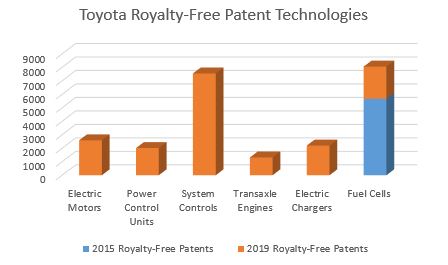05/04/2019
Back in 2014, Elon Musk announced that Tesla would be making their patents open source, as analysed in our previous blog post. One of the likely business reasons behind this decision was to try to increase the electric car market as a whole, of which Tesla would hope to take the lion’s share. A few days ago, Toyota made a similar announcement.
However, while Tesla may have a patent portfolio of a few hundred patent families, Toyota are well known to be a patent-filing powerhouse, and are offering royalty-free licenses for almost 24,000 patents (and patent applications) related to various aspects of battery, hybrid, and fuel cell electric vehicle technology. And this is on top of the 5,680 patents relating to fuel cell electric vehicles that the company is already offering royalty-free.
While the portfolio predominantly covers technology relating to hybrid electric vehicles, it spans a large range of technologies relevant to electric vehicles of various types. For example, the portfolio includes patents covering electric motors, system controls, and more fuel cell patents. The portfolio, as broken down by Toyota, is shown in the graph below.

In Toyota’s announcement, this is dressed up as an environmentally driven decision – the aim being to speed up the development and uptake of electric vehicles to replace traditional internal combustion vehicles, and thereby reducing C02 emissions. However, there may also be more direct economic motivations behind the decision. Looking through Toyota’s announcement, three things jump out.
Firstly, the 24,000 patents that Toyota is offering royalty-free include “patents awarded over more than 20 years of electrified vehicle technology development”. Given that the lifetime of a patent is 20 years from its filing date, it may be the case that a substantial portion of these patents are nearing the end of their lifetime, and so granting royalty-free licenses may not be particularly costly for Toyota.
Secondly, Toyota state that they will be offering “fee-based technical support” to other companies using Toyota’s technologies. By offering up many of these technologies royalty-free, Toyota is no doubt hoping that many other manufacturers will implement Toyota’s technology, and thus increase the market for their technical support. This could prove to be lucrative for Toyota, especially as such support could lead to ongoing revenue, rather than a one-off purchase.
Thirdly, Shigeki Terashi, Executive VP of Toyota, is quoted as saying “If the number of electrified vehicles accelerates significantly in the next 10 years, they will become standard, and we hope to play a role in supporting that process.” Indeed, Toyota may well be hoping that their technology becomes either the de-facto standard through a large uptake driven by the royalty-free licenses and the access to their technical support, or that it will be integrated into codified standards that become requirements for electric vehicle manufacturers. Of particular note is that Toyota intends to provide these licenses up until 2030. However, after that it is likely that such licences will have to be paid for. If Toyota can integrate its patents into standards in the next ten years, this could prove to be very profitable down the line.
An alternative, and perhaps cynical, view that has been put forward by some commentators is that by opening their portfolio of predominantly hybrid-focused patents, they hope to increase the hybrid electric vehicle market, even as other car manufacturers are turning to fully electric vehicles. Indeed, while Toyota leads the way in hybrid vehicles with the well-known Prius, they lag behind their competitors with no mass-market electric vehicles of their own. A fear that the hybrid market may soon become irrelevant might be behind the move by Toyota, with the hope being that by making their technology widely available more companies will make hybrid electric vehicles, extending the lifetime of the hybrid market as a whole.
However, while Toyota may generally be focusing on hybrid electric vehicles, many of their patents are likely to be relevant to battery electric vehicles as well. As such, even if the reasoning behind Toyota’s recent decision was related to prolonging the lifetime of the hybrid market, the patents they are offering royalty-free may well still be of interest to those making battery electric vehicles too.
This article is for general information only. Its content is not a statement of the law on any subject and does not constitute advice. Please contact Reddie & Grose LLP for advice before taking any action in reliance on it.


